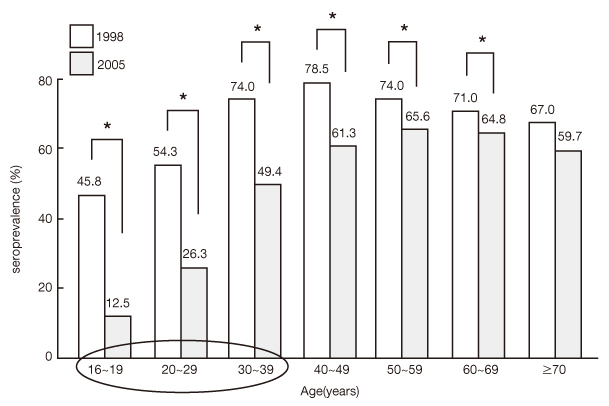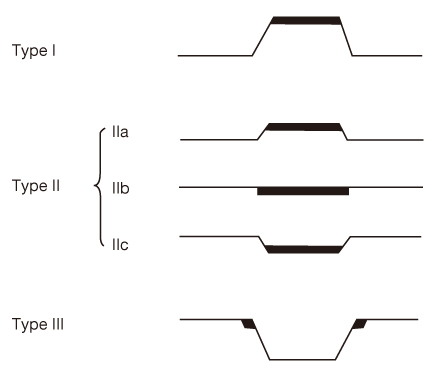J Korean Med Assoc.
2010 Apr;53(4):290-298. 10.5124/jkma.2010.53.4.290.
Screening and Diagnosis of Early Gastric Cancer
- Affiliations
-
- 1Department of Internal Medicine, Seoul National University College of Medicine, Korea. nayoungkim49@empal.com
- KMID: 2188292
- DOI: http://doi.org/10.5124/jkma.2010.53.4.290
Abstract
- Gastric cancer, the most common cancer in Korea, has come to be more frequently detected in the early stage thanks to regular endoscopy regardless of gastrointestinal symptoms. Early gastric cancer can be treated by endoscopic submucosal dissection or laparoscopic surgery, and its prognosis is very excellent. Thus, it is of an utmost importance to develop efficient screening method and set appropriate interval for the accurate diagnosis of early gastric cancer. Endoscopic screening for every two year is recommended, but the interval could be shortened in case of precancerous condition such as atrophic gastritis and intestinal metaplasia or subjects in a family with a history of gastric cancer. During the investigation, the benefit of using serology of H. pylori infection and serum pepsinogen I/II ratio of less than or equal to 3, instead of direct endoscopy, should also be considered for the selection of a high risk group of gastric cancer in Korea. Recently, appropriate screening and accurate diagnosis of early gastric cancer has become one of the most important issues.
Keyword
MeSH Terms
Figure
Cited by 1 articles
-
Epidemiology and screening of gastric cancer in Korea
Minkyo Song, Hwi-Won Lee, Daehee Kang
J Korean Med Assoc. 2015;58(3):183-190. doi: 10.5124/jkma.2015.58.3.183.
Reference
-
1. Cho IJ. Gastric cancer screening and diagnosis. Korean J Gastroenterol. 2009. 54:67–76.
Article2. Public Health, Welfare and Family, Korean Nat Cancer Center. Cancer state by statistics. 2008.3. Tsubono Y, Hisamichi S. Screening for gastric cancer in Japan. Gastric Cancer. 2000. 3:9–18.
Article4. Seo JH, Kim N, Lee DH, Kim JW, Hwang JH, Park YS, Kim SM, Kim HH, Park RY, Lee KS, Jung HC, Song IS. Clinical features and recent treatment trend of gastric cancer. Korean J Intern Med. 2006. 71:149–157.5. Miyamoto A, Kuriyama S, Nishino Y, Tsubono Y, Nakaya N, Ohmori K, Kurashima K, Shibuya D, Tsuji I. Lower risk of death from gastric cancer among participants of gastric cancer screening in Japan: a population-based cohort study. Prev Med. 2007. 44:12–19.
Article6. Oshima A, Hirata N, Ubukata T, Umeda K, Fujimoto I. Evaluation of a mass screening program for stomach cancer with a case-control study design. Int J Cancer. 1986. 38:829–833.
Article7. Fukao A, Tsubono Y, Tsuji I, HIsamichi S, Sugahara N, Takano A. The evaluation of screening for gastric cancer in Miyagi Prefecture, Japan: a population-based case-control study. Int J Cancer. 1995. 60:45–48.
Article8. Abe Y, Mitsushima T, Nagatani K, Ikuma H, Minamihara Y. Epidemiological evaluation of the protective effect for dying of stomach cancer by screening programme for stomach cancer with applying a method of case-control study-a study of a efficient screening programme for stomach cancer. Jpn J Gastroenterol. 1995. 92:836–845.9. Hisamichi S, Sugawara N. Mass screening for gastric cancer by X-ray examination. Jpn J Clin Oncol. 1984. 14:211–223.10. Lee KJ, Inoue M, Otani T, Iwasaki M, Sasazuki S, Tsugane S. JPHC Study Group. Gastric cancer screening and subsequent risk of gastric cancer: a large-scale population-based cohort study, with a 13-year follow-up in Japan. Int J Cancer. 2006. 118:2315–2321.
Article11. Oshima A, Hanai A, Fujimoto I. Evaluation of a mass screening program for stomach cancer. Natl Cancer Inst Monogr. 1979. 53:181–186.12. Inaba S, Hirayama H, Nagata C, Kurisu Y, Takatsuka N, Kawakami N, Shimizu H. Evaluation of a screening program on reduction of gastric cancer mortality in Japan: preliminary results from a cohort study. Prev Med. 1999. 29:102–106.
Article13. Mizoue T, Yoshimura T, Tokui N, Hoshiyama Y, Yatsuya H, Sakata K, Kondo T, Kikuchi S, Toyoshima H, Hayakawa N, Tamakoshi A, Ohno Y, Fujino Y, Kaneko S. Japan Collaborative Cohort Study Group. Prospective study of screening for stomach cancer in Japan. Int J Cancer. 2003. 106:103–107.
Article14. Kong SH, Park DJ, Lee HJ, Jung HC, Lee KU, Choe KJ, Yang HK. Clinicopathologic features of asymptomatic gastric adenocarcinoma patients in Korea. Jpn J Clin Oncol. 2004. 34:1–7.
Article15. Nam SY, Choi IJ, Park KW, Kim CG, Lee JY, Kook MC, Lee JS, Park SR, Lee JH, Ryu KW, Kim YW. Effect of repeated endoscopic screening on the incidence and treatment of gastric cancer in health screenees. Eur J Gastroenterol Hepatol. 2009. 21:855–860.
Article16. Kim N, Kim JW, Kim HJ, Chung MG, Park SM, Park JY, Nah BK, Nam SY, Seo KS, Ko BS, Jang JY, Kim BG, Kim JW, Park JJ, Hong SJ, Seong JK, Park KS, Kim SE, Park HS, Kim YS, Lim SH, Kim CH, Park MJ, Yim JY, Cho KR, Kim D, Park SJ, Jee SR, Song GA, Chung IS. Distribution of upper gastroduodenal diseases in health check-up subjects in 2006. Korean J Helicobacter Up Gastrointest Res. 2008. 8:1–8.17. Tashiro A, Sano M, Kinameri K, Fujita K, Takeuchi Y. Comparing mass screening techniques for gastric cancer in Japan. World J Gastroenterol. 2006. 12:4873–4874.18. Shin HR, Won YJ, Jung KW, Kong HJ, Yim SH, Lee JK, Noh HI, Lee JK, Pisani P, Park JG. Members of the Regional Cancer Registries. Nationwide cancer incidence in Korea, 1999~2001; First result using the national cancer incidence database. Cancer Res Treat. 2005. 37:325–331.
Article19. Yim JY, Kim N, Choi SH, Kim YS, Cho KR, Kim SS, Seo GS, Kim HU, Baik GH, Sin CS, Cho SH, Oh BH. Seroprevalence of Helicobacter pylori in South Korea. Helicobacter. 2007. 12:333–340.
Article20. Jae Il, Chung JI, Kim N, Kang KP, Nam TM, Lee JH, Choi HC, Lim YR, Lee SH, Park YS, Kim JW, Jeong SH, Lee DH. Seroprevalence of Helicobacter pylori in the health check-up population in 2007. Korean J Helicobacter Up Gastrointest Res. 2008. 8:71–75.21. Mori Y, Arita T, Shimoda K, Yasuda K, Yoshida T, Kitano S. Effect of periodic endoscopy for gastric cancer on early detection and improvement of survival. Gastric Cancer. 2001. 4:132–136.
Article22. Aida K, Yoshikawa H, Mochizuki C, Mori A, Muto S, Fukuda T, Otsuki M. Clinicopathological features of gastric cancer detected by endoscopy as part of annual health checkup. J Gastroenterol Hepatol. 2008. 23:632–637.
Article23. Correa P. Human gastric carcinogenesis: a multistep and multifactorial process-First American Cancer Society Award Lecture on Cancer Epidemiology and Prevention. Cancer Res. 1992. 52:6735–6740.24. Kim N, Park RY, Cho SI, Lim SH, Lee KH, Lee W, Kang HM, Lee HS, Jung HC, Song IS. Helicobacter pylori infection and development of gastric cancer in Korea: Long-term follow-up. J Clin Gastroenterol. 2008. 42:448–454.
Article25. Kim N, Park YS, Cho SI, Lee HS, Choe G, Kim IW, Won YD, Park JH, Kim JS, Jung HC, Song IS. Prevalence and risk factors of atrophic gastritis and intestinal metaplasia in a Korean population without significant gastroduodenal disease. Helicobacter. 2008. 13:245–255.
Article26. Zanghieri G, Di Gregorio C, Sacchetti C, Fante R, Sassatelli R, Cannizzo G, Carriero A, Ponz de Leon M. Familial occurrence of gastric cancer in the 2-year experience of a population-based registry. Cancer. 1990. 66:2047–2451.
Article27. Shin CM, Kim N, Yang HJ, Cho SI, Lee HS, Kim JS, Jung HC, Song IS. Stomach cancer risk in gastric cancer relatives: interaction between H. pylori infection and family history of gastric cancer for the risk of stomach cancer. J Clin Gastroenterol. 2010. 44:e34–e39.28. Rugge M, Correa P, Dixon MF, Fiocca R, Hattori T, Lechago J, Leandro G, Price AB, Sipponen P, Solcia E, Watanabe H, Genta RM. Gastric mucosal atrophy: interobserver consistency using new criteria for classification and grading. Aliment Pharmacol Ther. 2002. 16:1249–1259.
Article29. Miki K. Gastric cancer screening using the serum pepsinogen test method. Gastric Cancer. 2006. 9:245–253.
Article30. Kang JM, Kim N, Yoo JY, Park YS, Lee DH, Kim HY, Lee HS, Choe G, Kim JS, Jung HC, Song IS. The role of serum pepsinogen and gastrin test for the detection of gastric cancer in Korea. Helicobacter. 2008. 13:146–156.
Article31. Kitahara F, Kobayashi K, Sato T, Kojima Y, Araki T, Fujino MA. Accuracy of screening for gastric cancer using serum pepsinogen concentrations. Gut. 1999. 44:693–697.
Article32. Yoshihara M, Sumii K, Haruma K, Kiyohira K, Hattori N, Kitadai Y, Komoto K, Tanaka S, Kajiyama G. Correlation of ratio of serum pepsinogen I and II with prevalence of gastric cancer and adenoma in Japanese subjects. Am J Gastroenterol. 1998. 93:1090–1096.
Article33. Oishi Y, Kiyohara Y, Kubo M, Tanaka K, Tanizaki Y, Ninomiya T, Doi Y, Shikata K, Yonemoto K, Shirota T, Matsumoto T, Iida M. The serum pepsinogen test as a predictor of gastric cancer: the Hisayama study. Am J Epidemiol. 2006. 163:629–637.34. Ohata H, Kitauchi S, Yoshimura N, Mugitani K, Iwane M, Nakamura H, Yoshikawa A, Yanaoka K, Arii K, Tamai H, Shimizu Y, Takeshita T, Mohara O, Ichinose M. Progression of chronic atrophic gastritis associated with Helicobacter pylori infection increases risk of gastric cancer. Int J Cancer. 2004. 109:138–143.
Article35. Watabe H, Mitsushima T, Yamaji Y, Okamoto M, Wada R, Kokubo T, Doi H, Yoshida H, Kawabe T, Omata M. Predicting the development of gastric cancer from combining Helicobacter pylori antibodies and serum pepsinogen status: a prospective endoscopic cohort study. Gut. 2005. 54:764–768.
Article36. Japanese Gastric Cancer Association. Japanese classification of gastric carcinoma - 2nd English edition. Gastric Cancer. 1998. 1:10–24.37. Xi WD, Zhao C, Ren GS. Endoscopic ultrasonography in preoperative staging of gastric cancer: determination of tumor invasion depth, nodal involvement and surgical resectability. World J Gastroenterol. 2003. 9:254–257.
Article38. Willis S, Truong S, Gribnitz S, Fass J, Schumpelick V. Endoscopic ultrasonography in the preoperative staging of gastric cancer: accuracy and impact on surgical therapy. Surg Endosc. 2000. 14:951–954.
Article39. Bhandari S, Shim CS, Kim JH, Jung IS, Cho JY, Lee JS, Lee MS, Kim BS. Usefulness of threedimensional, multidetector row CT (virtual gastroscopy and multiplanar reconstruction) in the evaluation of gastric cancer: a comparison with conventional endoscopy, EUS, and histopathology. Gastrointest Endosc. 2004. 59:619–626.
Article40. Ganpathi IS, So JB, Ho KY. Endoscopic ultrasonography for gastric cancer: does it influence treatment? Surg Endosc. 2006. 20:559–562.41. Bentrem D, Gerdes H, Tang L, Brennan M, Coit D. Clinical correlation of endoscopic ultrasonography with pathologic stage and outcome in patients undergoing curative resection for gastric cancer. Ann Surg Oncol. 2007. 14:1853–1859.
Article



